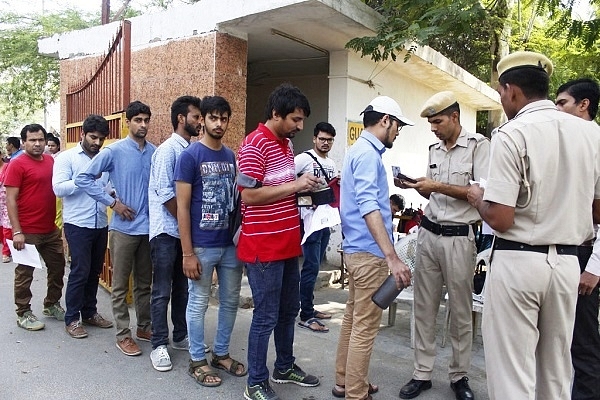News Brief
UPSC 2020 GS 4 Ethics Paper Analysis: Trend Is Towards Tough Questions, Be Well-Read And Not Only Well-Prepared

UPSC aspirants appearing for exam (Yogendra Kumar/Hindustan Times)
In the last three parts of this series, we discussed the General Studies -1, General Studies - 2, and General Studies - 3 papers of the UPSC Civil Services (Main) Exam (CSE Main) 2020. In this part we shall discuss the General Studies - 4 (GS-4) paper.
The total candidates allowed to appear for UPSC Main exam are around twelve to thirteen times the number of the vacancies. For UPSC 2020, the total number of vacancies was 796 so accordingly around 10 thousand candidates would have given the UPSC Mains 2020.
GS-4 paper analysis
The GS-4 paper this year can be called as leaning towards tough. There were very few questions that the candidates could do from their standard coaching notes. For example, the questions on New Education Policy, 2020 (albeit it wasn’t that easy because candidate had to interpret it in the light of a quote), components of emotional intelligence, teachings of Buddha, difference between laws and rules, etc. Even these questions had a creative aspect - present relevance etc.
Many questions were on the tougher side because they touched upon topics not usually read by the students, and these were deep concepts. For example, the questions on will to power, ethics and Comprehensive National Power, hatred poisoning a nation’s spirit, etc.
Many questions required imaginative thinking on the part of students. For example, the questions on the interpretation of quotations.
The ethics question paper is also longer than the other general studies papers due to multiple subparts of lengthy case-studies. This is further challenging because it, in many ways, requires the most improvisation.
The trend suggests that ethics paper will continue to be tough. This provides an opportunity to the examiner to separate a general aspirant from the one who is truly well-read.
One earlier suggestion that we gave for GS-1, GS-2, GS-3 papers applies here as well. Candidates should study ‘mindfully’ and always think of the questions that can come while studying the syllabus.
Candidates should pick current affairs while reading the newspaper and, if not possible in writing, at least make a mental schema on the ethical aspects of the case. Many editorials critiquing a government policy also contain the ethical aspect. Candidates should pay special attention to these. One can also note these down at one place so it is easier to revise. Using these concepts in the answers will not only increase the quality, but for many questions, it would be impossible to write answers without these.
For example, students who knew about shareholder versus stakeholder capitalism, theory of trusteeship etc. could have written a better answer in the case study on Amria Plastic Works (APW).
It is also important to practice papers before the exam. The aim shouldn’t just be to complete the paper or attempt sufficient questions, but also to write quality answers.
Support Swarajya's 50 Ground Reports Project & Sponsor A Story
Every general election Swarajya does a 50 ground reports project.
Aimed only at serious readers and those who appreciate the nuances of political undercurrents, the project provides a sense of India's electoral landscape. As you know, these reports are produced after considerable investment of travel, time and effort on the ground.
This time too we've kicked off the project in style and have covered over 30 constituencies already. If you're someone who appreciates such work and have enjoyed our coverage please consider sponsoring a ground report for just Rs 2999 to Rs 19,999 - it goes a long way in helping us produce more quality reportage.
You can also back this project by becoming a subscriber for as little as Rs 999 - so do click on this links and choose a plan that suits you and back us.
Click below to contribute.
Latest